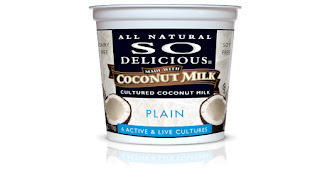[But who am I kidding, I'm a latte LOVER and staying away from milk to sip on one of those is always tough. Personally, I keep my latte buys for Saturdays and Sundays when I can sip it in leisure while reading my favorite book or talking with a good friend.]
It's about progress, not perfection.
Trying to be perfect in any area- especially your lifestyle diet- will most likely come around to bite you. So eat those healthy, life-giving foods most days. Choose your foods one meal at a time. And if you take a step back to drink a latte on a Sunday morning, no one is going to fault you. Savor every sip. RELISH in it!
Simple Recipe for a Dairy-Free Yogurt Treat:
Coconut Yogurt by SO Delicious. I advise getting the plain flavor as it has less sugar. You can purchase this yogurt from your local Whole Foods or Sprouts. Throw some in a bowl and then add...

Lime. Yep, a lime! Cut up some fresh lime wedges and squeeze over your yogurt. A trick: sometimes limes can be incredibly hard to squeeze and they can seem practically juiceless! Throw your cut lime in a small dish and pop it in the microwave for a handful of seconds. This will get the juices out. And the bowl will keep it from dripping all over your microwave.

Honey. Drip some honey over the yogurt. My favorite brand is Honey Pacifica made fresh & raw by a man in Long Beach. (http://www.honeypacifica.com/) You can purchase this honey at the Friday Farmers Market in Huntington Beach, online, or at your local Whole foods or Mother's Market. He infuses his honey with all natural flavors such as mango or sage. My favorite is the mango.

Almonds (or nuts of choice). Toss a handful of some shaved almonds or pecans of walnuts atop your yogurt. I am always looking to add crunch to my foods! The nuts will also add good fats to your snack and keep you fuller, longer.

See...healthy foods actually taste GOOD.

